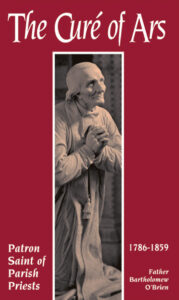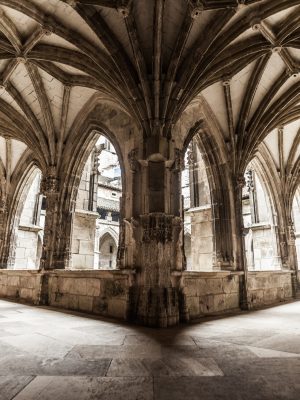Even the Devil came to Ars. Indeed, he had a reason. By the mouth of a possessed woman, he exclaimed one day to the Curé, “How thou makest me suffer! If there were three men on earth like thyself, my kingdom would be destroyed.” Father Vianney was outwitting the proud devil by saving so many souls. The kingdom of Heaven seemed to be growing faster than the kingdom of Hell. Frustrated, the devil would roar like a bull, growl like a bear, or snarl like a dog in an effort to intimidate the Curé. With a fearful voice he would cry out: “Vianney! Vianney! Potato eater! Ah, thou art not yet dead! I shall get thee, all right.”
“The devil,” according to Father Tanquerey, “jealous of God’s influence on the souls of the Saints, strives to exercise his own dominion, or rather his tyranny, over men. At times he, so to speak, besieges the soul from without by assailing it with horrible temptations. (This is called obsession.) The devil can act upon all the external senses: upon the sense of hearing, by causing blasphemous or obscene words or songs to be heard or by creating frightful noises, such as were experienced at times by the sainted Curé of Ars.” (The Spiritual Life, The Very Rev. Adolphe Tanquerey, p. 718.)
For about thirty-five years (1824-1858), the devil tried in vain to discourage the Curé in his work for souls. But the devil fought a losing battle. As the wind fans the flame to burn more brightly, so those diabolical manifestations, far from snuffing out the Curé’s efforts for souls, served rather to enkindle his zeal.
At first, the Curé thought a swarm of rats and mice had invaded his rectory. So he placed a pitchfork near the head of his bed. Night would come—and with the night, noises. It seemed as if the rodents tore the curtains of his bed to threads. But when morning came, he would find all the curtains intact. Soon the Curé feared to remain alone at night. He invited a husky young man of the village, Andrew Verchére, to stay at the rectory with him. He lasted only one night. At one o’clock, the handle and lock of the front door were violently shaken. Then the blows, like those of a club, pounded against the door. At the same time, the racket of the rumbling of many carts seemed to fill the rectory. “My poor Verchére,” the Curé told later, “was shaking with fear. Though he was holding his gun in his hand, he no longer knew he had a gun.”
It was not long before the Curé realized the true nature of the uproar. “I came to the conclusion,” he admitted to the Bishop, “that it was the devil, because I was afraid. The good God does not frighten us.” When he had reached that conclusion the Curé dismissed his bodyguard, discarded his pitchfork, and girded himself to meet the devil alone—ready (strong in faith) to resist the adversary. His weapons were many relics in-cased in a large silver reliquary, prayer, the Sign of the Cross, and words of contempt and scorn for the devil. To belittle the whole situation, he nicknamed the devil the “grappin.” His simple remark to those who questioned him was, “One gets used to everything, my friend. The grappin and I are almost comrades.”
The grappin had work to do, and he did it. Nightly, he visited the Curé, annoying him by his continual and never-ending noise. Noise, noise, noise—that was his secret weapon. He reproduced the sound of a hammer driving nails into a wooden floor; he drummed on the table; he screeched a shrill song. “The grappin has a very ugly voice indeed,” dryly quipped the Curé. At times the Curé would feel a hand passing over his face, or a drove of rats running over his body. Now he would be jerked from his bed; then again he would feel as if his hard bed were soft, sensuous and tempting. The whole rectory seemed as infested with the devil’s presence as with the darkness of the night. Once the evil spirit tried to set fire to his bed. The Curé simply remembered, “The villainous grappin! He could not catch the bird, so he burns the cage.”
Some of his fellow priests insinuated that all of this was probably a figment of the Curé’s imagination. “It is your head,” some of them remarked, “that plays you tricks!” However, in a short time they changed their minds. A jubilee was being preached in a neighboring church, and the Curé of Ars was invited. Because of the distance, many of the priests remained for the night, including Father Vianney. After all had retired, the stillness of the night was suddenly broken by a sound like the rumbling of a heavy cart. The rectory shook. An uproar arose in Father Vianney’s room. “The Curé of Ars is being murdered!” The priests rushed to his room, threw open the door, burst into the room—only to find the good Curé resting peacefully on his bed. “It is the grappin,” he said with a smile. “I am sorry I forgot to warn you beforehand. However, it is a good sign: there will be a big fish tomorrow.” There was. And the priests believed.
Soon, the grappin became a kind of messenger of big sinners. When the devil suspected ahead of time that a big sinner was returning to confession, in his jealousy, he would take out his vengeance on the Curé of Ars. Once after a night of hellish hubbub, the Curé mentioned to a villager, “No doubt at this very moment there are some sinners on the road to Ars.” The devil could not win; and coward that he is, gradually he gave up his nightly visits. Hell was more pleasant than defeat; fire burns less than broken pride. So the devil returned to Hell, and the Curé went on saving souls in Ars.
This article below is taken from a chapter of The Curé of Ars: Patron Saint of Parish Priests by Fr. Bartholomew J. O’Brien, which is available from TAN Books.





